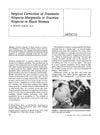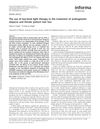 57 citations,
September 2005 in “International Journal of Dermatology”
57 citations,
September 2005 in “International Journal of Dermatology” Frequent use of chemical hair relaxants is linked to increased scarring hair loss in Nigerian women.
 51 citations,
January 2012 in “Annals of dermatology/Annals of Dermatology”
51 citations,
January 2012 in “Annals of dermatology/Annals of Dermatology” A boy with alopecia regrew hair using a vitamin D cream after other treatments failed.
 50 citations,
January 2016 in “The Journal of Clinical Endocrinology and Metabolism”
50 citations,
January 2016 in “The Journal of Clinical Endocrinology and Metabolism” Certain microRNAs in the fluid around eggs are linked to Polycystic Ovary Syndrome and may help diagnose it.
 49 citations,
November 2019 in “Egyptian Journal of Medical Human Genetics”
49 citations,
November 2019 in “Egyptian Journal of Medical Human Genetics” Certain gene variants may contribute to high androgen levels in women with polycystic ovary syndrome.
 49 citations,
April 2000 in “Journal of The American Academy of Dermatology”
49 citations,
April 2000 in “Journal of The American Academy of Dermatology” Despite progress in treatment, the exact cause of Alopecia areata is still unknown.
 46 citations,
September 2003 in “International Journal of Dermatology”
46 citations,
September 2003 in “International Journal of Dermatology” Trichodynia found in 29% of TE or AGA patients, linked to psychological conditions.
 45 citations,
January 2006 in “Endocrine journal”
45 citations,
January 2006 in “Endocrine journal” To diagnose Polycystic Ovarian Syndrome, two out of three signs—irregular periods, high male hormone levels, or cysts on the ovaries—are needed.
 43 citations,
November 2007 in “Journal of Investigative Dermatology Symposium Proceedings”
43 citations,
November 2007 in “Journal of Investigative Dermatology Symposium Proceedings” The document concludes that proper diagnosis and treatment of common scalp disorders are important for both physical and psychological health.
 42 citations,
June 2015 in “Gynecological Endocrinology”
42 citations,
June 2015 in “Gynecological Endocrinology” Women with PCOS often have mood disorders and a lower quality of life, and treatment should focus on both physical and mental health.
 41 citations,
June 2016 in “Reviews in endocrine and metabolic disorders”
41 citations,
June 2016 in “Reviews in endocrine and metabolic disorders” Hidradenitis suppurativa may be related to hormones and patients often have metabolic disorders; more research is needed to understand this connection.
 36 citations,
January 2012 in “International Journal of Trichology”
36 citations,
January 2012 in “International Journal of Trichology” Losing eyelashes or eyebrows can be a sign of many different health problems and needs a careful approach to treat effectively.
 35 citations,
January 2006 in “Journal of Dermatological Treatment”
35 citations,
January 2006 in “Journal of Dermatological Treatment” Zinc can help with some skin problems, but its effectiveness varies depending on the condition.
 35 citations,
January 2002 in “Dermatology”
35 citations,
January 2002 in “Dermatology” A woman's hair loss during treatment with specific hepatitis C drugs grew back after stopping the medication.
 34 citations,
October 2011 in “Pathology Research International”
34 citations,
October 2011 in “Pathology Research International” Behçet's Disease may be caused by genetic and environmental factors leading to abnormal immune responses, and stress management and new treatments could improve patient outcomes.
 32 citations,
November 2011 in “Reproductive Sciences”
32 citations,
November 2011 in “Reproductive Sciences” Brazilian women with PCOS and both menstrual irregularity and high male hormone levels have a higher chance of having metabolic syndrome.
 32 citations,
January 1986 in “The Journal of Dermatologic Surgery and Oncology”
32 citations,
January 1986 in “The Journal of Dermatologic Surgery and Oncology” Surgical correction can treat hair loss in black women caused by styling practices, with techniques chosen based on individual needs and hair loss severity.
 31 citations,
March 2018 in “Frontiers in Immunology”
31 citations,
March 2018 in “Frontiers in Immunology” The document concludes that anti-dsDNA antibodies are not unique to SLE and their use as indicators is doubtful, highlighting the need for better understanding and classification of the disease.
 31 citations,
July 2015 in “Clinical, Cosmetic and Investigational Dermatology”
31 citations,
July 2015 in “Clinical, Cosmetic and Investigational Dermatology” Hair restoration surgery effectively treats hair loss with natural-looking results, using techniques like stem cells and platelet-rich plasma.
 29 citations,
June 2013 in “Journal of the Saudi Society of Dermatology & Dermatologic Surgery”
29 citations,
June 2013 in “Journal of the Saudi Society of Dermatology & Dermatologic Surgery” Alopecia areata is an autoimmune hair loss condition treated with corticosteroids, and histologic confirmation is the best diagnosis method.
 29 citations,
March 1983 in “Journal of The American Academy of Dermatology”
29 citations,
March 1983 in “Journal of The American Academy of Dermatology” New treatments for psoriasis have improved effectiveness and may reduce long-term side effects when combined with standard therapies.
 28 citations,
July 2017 in “Journal of Endocrinological Investigation”
28 citations,
July 2017 in “Journal of Endocrinological Investigation” Early onset baldness in men may indicate a condition similar to PCOS, linked to heart disease, diabetes, and prostate issues.
 28 citations,
January 2007 in “Journal of dermatology”
28 citations,
January 2007 in “Journal of dermatology” Three white adults had a rare scalp condition with increased fat and sometimes hair loss, suggesting it's not limited to black women and might be more widespread.
 28 citations,
May 1994 in “The Journal of Urology”
28 citations,
May 1994 in “The Journal of Urology” Topical minoxidil not effective for erectile dysfunction treatment.
 22 citations,
August 2011 in “Endocrine Practice”
22 citations,
August 2011 in “Endocrine Practice” Most hirsutism cases are due to PCOS, and treatment focuses on lowering testosterone and blocking its effects.
 22 citations,
May 1999 in “International Journal of Dermatology”
22 citations,
May 1999 in “International Journal of Dermatology” Hair loss from genetics and hormones can be treated with drugs or surgery.
 21 citations,
April 2019 in “Clinical, cosmetic and investigational dermatology”
21 citations,
April 2019 in “Clinical, cosmetic and investigational dermatology” The document concludes that stopping shaving or removing affected hair can alleviate Pseudofolliculitis barbae (PFB).
 21 citations,
August 2013 in “Journal of Dermatological Treatment”
21 citations,
August 2013 in “Journal of Dermatological Treatment” Low-level light therapy may help hair regrowth, but more research is needed.
 20 citations,
January 2012 in “International journal of trichology”
20 citations,
January 2012 in “International journal of trichology” Steroids are the best treatment for Alopecia Areata with few side effects.
 20 citations,
January 2012 in “International Journal of Trichology”
20 citations,
January 2012 in “International Journal of Trichology” Most cases of excessive hair growth in women are caused by polycystic ovarian syndrome and are linked to higher free testosterone levels.
 18 citations,
July 2010 in “Expert Review of Endocrinology & Metabolism”
18 citations,
July 2010 in “Expert Review of Endocrinology & Metabolism” The document concludes that PCOS has a strong genetic component, but more research is needed to fully understand the specific genes involved.






























